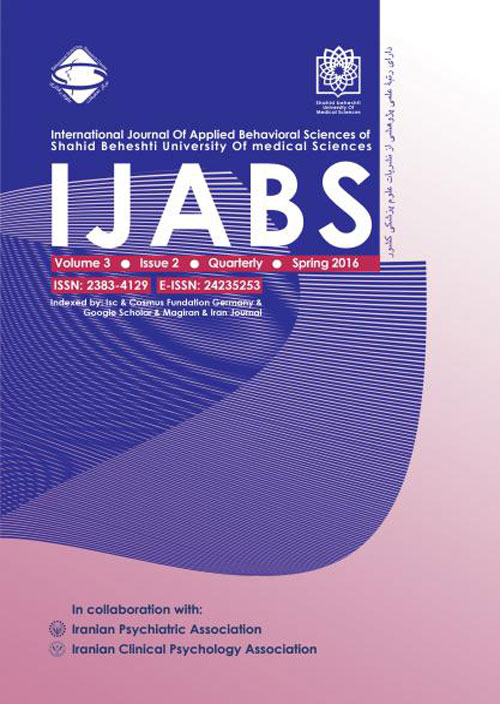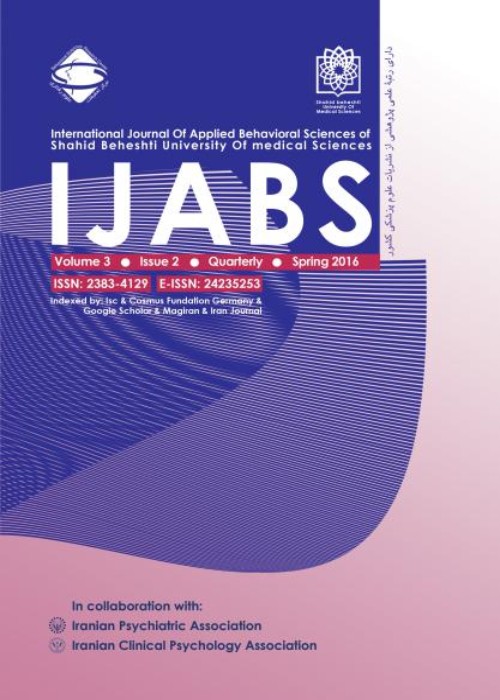فهرست مطالب

International Journal of Applied Behavioral Sciences
Volume:7 Issue: 4, Autumn 2020
- تاریخ انتشار: 1400/01/14
- تعداد عناوین: 6
-
-
Pages 1-10Introduction
Resilience and marital commitment can be considered as a protective factor for maintaining the relationship. On other hand, rumination is a psychological vulnerability factor that has negative effects on resilience and marital commitment. The present study was conducted aimed to predict marital dissatisfaction based on resilience, marital commitment, and rumination in couples seeking for separation.
MethodThe present study was a cross-sectional study in the form of correlational design. 170 women were selected using purposive sampling from all married women referred to the Dispute Resolution Council in Tehran. Data were collected using demographic checklist, structured clinical interviews, Couple Burnout Measurement, Resilience Scale, rumination questionnaire, and marital commitment scale. Data were analyzed by Pearson correlation coefficient and multiple regression.
Resultsthe results showed that triple components of commitment had a significant and indirect relationship with couple burnout (p< 0.05). Also, there was a significant indirect relationship between rumination with couple burnout and resilience with couple burnout (p< 0.05). Considering the Beta weight based on the first model showed that a standard deviation of change in rumination constituted 0.43 standard deviation of couple burnout. Also, beta coefficients in the second model indicated that a standard deviation of the simultaneous change in rumination dimensions and moral commitment would explain 0.43 and 0.312 standard deviations in couple burnout, respectively (all p's<0.01).
ConclusionThese results indicate the role of psychological components in predicting the marital satisfaction and can have clinical applications in designing clinical interventions.
Keywords: Marital commitment, Marital dissatisfaction, Resilience, Rumination -
Pages 11-23Introduction
Gastroesophageal reflux disease is one of the most common diseases of the gastrointestinal tract. Stressors along with anxiety and depression, reduce a person's ability to cope with life's problems and play an important role in exacerbating the symptoms of GERD. Women are more fragile and vulnerable in this situation. This study investigates the effectiveness of mindfulness-based stress reduction on depression, anxiety, and stress in women with gastroesophageal reflux disease.
MethodThe present study is a pre-test, post-test and follow-up design. Sampling was done purposefully, in which 30 women with gastroesophageal reflux disease who were referred to Hazrat Rasool Akram Hospital in Tehran were randomly selected. They were divided into experimental and control groups. The experimental group underwent stress reduction-based mindfulness training in 8sessions in 2-hour. The control group did not receive any training. Data were collected using the Depression, Anxiety and Stress Scale (DASS-21). All participants completed the questionnaire at three time points (pre-test, post-test, follow-up). Data obtained from the research were analyzed by analysis of covariance (ANCOVA and MANCOVA) using SPSS software.
ResultsThe results showed that stress-based mindfulness training is effective in reducing depression, anxiety and stress in women. (p<0.05)
ConclusionThe results showed that the effectiveness of stress-based mindfulness therapy could be used as a complementary intervention method along with other common therapies to improve depression, anxiety and stress in women with gastroesophageal reflux disease.
Keywords: Mindfulness based on stress reduction, Depression, Anxiety, Stress, Gastroesophageal reflux disease -
Pages 24-33Introduction
Cardiovascular disease, as a chronic and debilitating physical condition, is one of the most common causes of mortality. This study aimed to investigate the mediating role of lifestyle in the relationship between resilience and quality of life in cardiovascular patients.
MethodThe present study was a descriptive-correlational and structural equation. The statistical population of the present study includes all cardiovascular patientsreferring to cardiovascular hospitals in Tehran in 2019, of which 303 people were selected as the sample by the purposed sampling method. Data collection tools included the qualityof life,health-promoting lifestyle profile, and Connor Davidson resilience scale.
ResultsThe results showed there is a significant positive relationship between lifestyle with quality of life in patients with heart disease. Resilience had a positive relationship with quality of life. Lifestyle also played a mediating role in resilience to quality of life (P<0.01).
ConclusionBased on this, in the field of designing the necessary measures to improve the quality of life in cardiovascular patients, it is possible to develop programs to strengthen resilience and a healthy lifestyle.
Keywords: cardiovascular disease, resilience, lifestyle, quality of life -
Pages 34-49Introduction
Social well-being is one of three employee well-being dimensions and the missed piece of subjective well-being literature. The purpose of current research was modeling the social well-being in workplace, based on person-situation model and social exchange theory. This mediated-moderated structural model is developed considering the interactive role of bright and dark triad and collectivism organizational culture, besides mediation role of social influence tactics.
MethodPartial least squares structural equation modeling (PLS-SEM) was used for analyzing this second-order hierarchical latent variable model. Participants were 292 employees of Iran National oil Company in the summer of 1398.
ResultsFitness indices indicates the good fitness of social-wellbeing model (SRMR<0.08, NFI>0.9). Results showed that bright side of personality and collectivism organizational culture affect social well-being directly. In addition, findings showed that dark triad influences on social well-being is fully mediated by social influence tactics; so that Machiavellianism and narcissism increase the social well-being levels by influencing soft influence tactics utilization; Whereas psychopathy leads to applying hard influence tactics and cause social well-being reduction. Moderating effect of collectivism organizational culture on bright side of personality and social well-being was confirmed as well.
ConclusionOverall findings indicate that personality factors are important determinants of social well-being, but understanding the social well-being construct in workplace requires including the whole image of bright and dark side of personality, as well as organization cultural factors.
Keywords: Collectivist culture, Dark Triad, Personality, Social Well-Being, Social Influence -
Pages 50-58Introduction
Metacognitive therapy for post-traumatic stress disorder (PTSD) has been developed based on the role of meta-cognitive processes and beliefs in anxiety disorders. In this study, the effectiveness of meta-cognitive therapy on PTSD has been investigated.
MethodThis quasi-experimental study with pre-test and post-test was carried out. The sample consisted of patients with PTSD who referred to Professor Moharri Hospital in Shiraz (N=12). Participants were selected using a structured clinical interview (SCID-I). Sample subjects underwent individual meta-cognitive therapy in 10 sessions. Depression, Stress, and Anxiety Scale was used as a measurement tool in pretest, posttest and follow up. Data were analyzed using descriptive statistics and dependent t-test.
ResultsAccording to the results,learning metacognitive skills and coping strategies of metacognition reduces the symptoms of mental illnesses such as anxiety, depression and tension in people with PTSD (p<0.05).
ConclusionMetacognitive therapy is an effective therapeutic approach that has resulted from systematic modeling and hypothesis and has resulted in techniques whose effectiveness in scientific studies has been proved.
Keywords: Posttraumatic stress disorder, Meta-cognitive therapy, Anxiety, Depression, Stress -
Pages 59-68Introduction
The present study aimed to compare the effectiveness of the classical Pennsylvania prevention program and program based on Iranian-Islamic criteria on the marital satisfaction of mothers with an autisticchild.
Method45 volunteers have been selected through convenience sampling among mothers of autistic children, having medical records at the Rehabilitation Center of Shahrud, and whose disorders were approved by an expert psychologist. The samples were randomly placed into two intervention groups and a control group (each group 15 subjects). The interventions were conducted in five,2-hour sessions per weak and the participants responded ENRICH Marital Satisfaction Scale (EMS) before and after the interventions. Data analysis was donethrough ANCOVA and MANCOVA.
ResultsThe results showed that three groups have a significant difference in a total score of marital satisfaction and components of satisfaction, conflict resolution, leisure time (p<0.05). The effectiveness of the Pennsylvania prevention program based on Iranian-Islamic criteria was significantly higher than the Pennsylvania Prevention program(p<0.05).
ConclusionAccordingly, Pennsylvania Prevention Program has positive effects on psychological health and improves maritalrelationships by combining a variety of approaches and techniques including psychoeducation, cognitive-behavioral therapy, rational-emotional therapy, problem-solving and social skills training.
Keywords: Pennsylvania prevention program, Iranian-Islamic criteria, Marital satisfaction, Mothers, Autism


